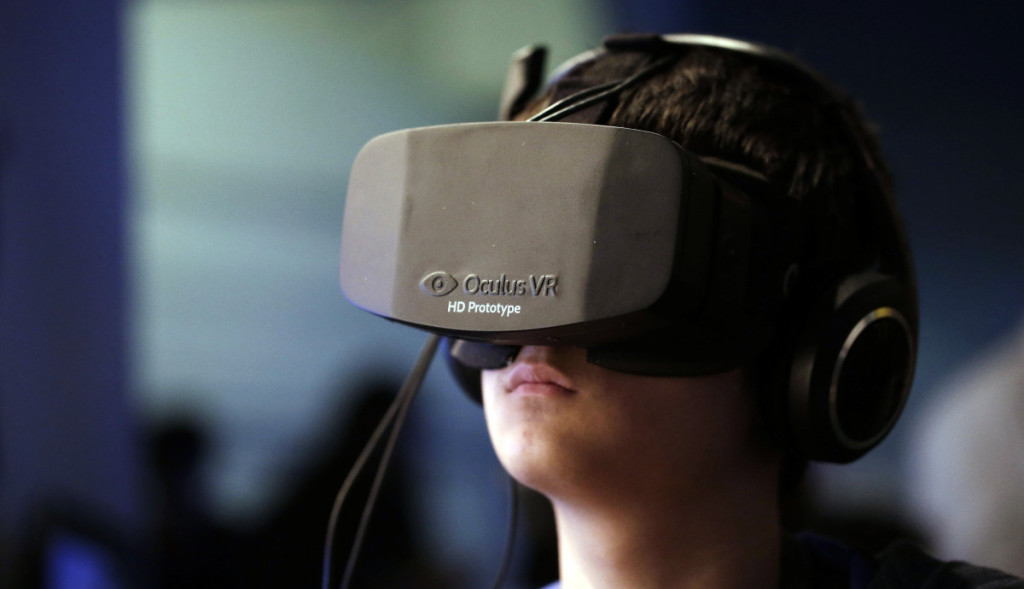It was unclear why back in March of last year Facebook spent $2 billion to acquire Oculus VR, the company behind the virtual reality gaming headset, Oculus Rift. The popular theory at the time was that Facebook was investing in technology of the future, and would somehow take what Oculus had started and develop it alongside its social media principle.
Last Tuesday, while onstage at the Code/Media Conference, Facebook Chief Product Officer Chris Cox shed further light on the company’s ambitions as he lauded the virtual reality experience and talked about how Facebook is currently developing apps for it. “You realize, when you’re in it,” he said, “that you’re looking at the future, and it’s going to be awesome.” In what I imagine as his best Don Draper “carousel” pitch, he brush stroked scenes in which you put on a VR headset and find yourself inside a Blue Angel fighter jet, or maybe courtside at an NBA game. But the most interesting segment came when Cox was asked whether people would be able to make their own virtual reality content. “Totally,” he said. “You’ll do it…Beyonce will do it.”
Damn. But will she though?
Tis my first twitt-er. Or tweet? Twit? Or tweet? “Twit or tweet everybody.” Is this anything?
— Ellen DeGeneres (@TheEllenShow) March 10, 2009
As I thought about Cox’s statement, I couldn’t help but think back to the days when status updates seceded from Facebook and birthed an entirely new platform in Twitter. Not only was it the first big step in bringing instantaneous contact to virtual communities, it was the first medium to really bridge the gap between celebrities and their fans. Remember how uncanny it was to see someone like Diddy tweeting random shit at Knicks games, or what about Ellen being Ellen? For the most part, it all seemed pretty candid; that is, until celebrities – and the branding consortiums behind them – discovered how to scale this new reach into beaucoup bucks.
Fast forward to today, and that’s how you get the Niykee Heaton’s of the Instagram world. Or worse yet, athletes like Colin Kaepernick or Nick “Swaggy P” Young who begin treating their respective sports like freelance gigs. Branding tactics can be so in your face at times (Russell Westbrook for True Religion) that it starts to feel disingenuous, and there’s no shortage of trolls on the internet whose sole purpose is to throw salt in these wounds. Many stars don’t take well to it and end up firing back in order to protect their image – only to send out that apology tweet hours later in an effort to…you guessed it…protect their image.
This idea of calculated branding as being the new driving force of celebrity has turned a useful tool like social media into a place where stars spend more time trying to ignore the public rather than engaging with it, electing to spoon-feed fans exactly what they want them to see and how they want them to see it.
I wouldn’t say that social media today has increased the distance between pop culture figures and the rest of us, but I’d argue that the veil is thicker. As far as Beyonce is concerned, not that she has anything to hide – or left to prove – but while she may claim that the surprise release of her self-titled album was her way of speaking directly to her fans, it still remains that this sort of laissez-faire, forfeit of power approach to marketing actually shows someone who has the most power of all: the ability to control her own brand and the conversation around it.
Beyonce is arguably the most relatable, yet unrelatable artist of all time, so it’s hard to envision someone like her gleaming at the opportunity to share her world as its happening through VR. It’s hard for me to see anyone with substantial social influence putting themselves in a situation where there’s no edit button, filter, or PR meeting before content is shared. I’m not talking a YouTube livestream type of sharing; I’m talking me in your actual world sharing. I’d be interested to see it happen though. Sure, virtual reality technology doesn’t come without its many moral and social drawbacks, but there’s also the possibility that it could recreate the unwilted candor that Twitter popularized in its adolescent years – you know, back when social media actually made people seem human.

